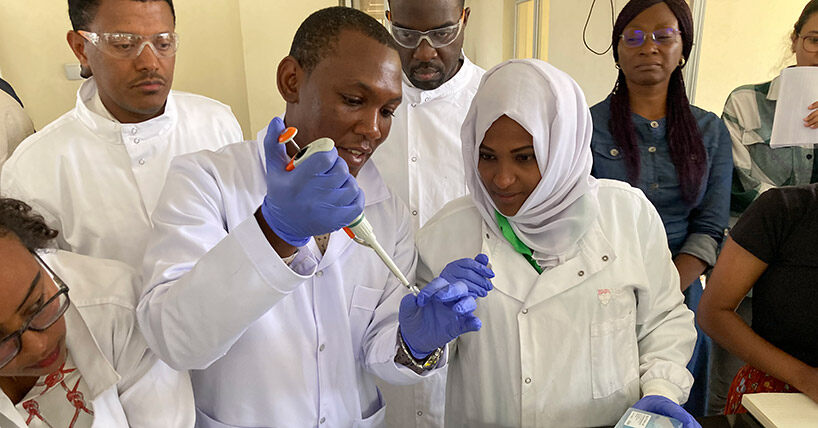Newcastle University’s ‘Suitcase Laboratory’ played a key role in a Pan-African workshop exploring advanced water testing methods.


GCRF Water Security and Sustainability Hub researchers from Newcastle University in the UK, Newcastle University Medicine Malaysia (NUMed), and the International Water Management Institute (IWMI) in Ethiopia, collaborated with colleagues from Ardhi University in Tanzania and the Addis Ababa Water and Sewerage Authority (AAWSA) to deliver a Pan-African workshop on molecular microbiology in the new-built AAWSA wastewater laboratory at the Kality sewage treatment plant in Addis Ababa, Ethiopia.
The researchers used the ‘Lab in a Suitcase’, a portable testing lab, to analyse the results. The results collected during the workshop revealed that the Little Akaki river water gets heavily polluted with untreated sewage while it passes through Addis Ababa.
The results also showed that further expansion of wastewater collection in the city for treatment in sewage treatment works like those at Kality could make an enormous difference to the river and riverine communities in Ethiopia, since Kality sewage treatment plant effluent had better water quality than the Little Akaki river downstream of the city.
Innovation in water testing
Professor David Werner, of Newcastle University’s School of Engineering, said: “Within the week of the workshop, participants were able to establish that the Little Akaki River downstream of Addis Ababa contained concentrations of Faecal Coliforms and Streptococci bacteria that were 4,000 to 7,000 times higher than in upstream of Ethiopia’s capital.
“Similarly, genetic markers for total bacteria (16S rRNA) and human host associated Bacteroides (HF183) were elevated by 75 and 9,000 times, respectively, in the river downstream as compared to the river upstream of Addis Ababa. In fact, the concentrations of faecal bacteria observed in the river downstream of the city were similar to the levels observed in untreated sewage from the inlet of the Kality sewage treatment works. Notably, the sewage treatment plant effluent had significantly better water quality than the Little Akaki River downstream of Addis Ababa. From the sequencing results, a high prevalence of (Ali)arcobacter bacteria was observed in the wastewater and river downstream samples. These bacteria represent a still poorly understood waterborne hazard, as several species of (Ali)arcobacter can cause watery diarrhoea.
“Participants communicated insights and findings from their own work, shared tips on how to purchase consumables for research in Africa, formed friendships, and set up a WhatsApp group for future knowledge exchange. The seeds have thus been planted for many Pan-African collaborations that will flower in the future. Indeed, bunches of roses were already handed out during the workshop to celebrate International Women’s Day and everyone who was in attendance.”
Thirty-seven trainees from 10 African countries gained hands-on experience in analysing river water and wastewater samples via plate counting, qPCR, and 16S rRNA gene amplicon sequencing methods with the affordable and portable tools of Newcastle University’s innovative suitcase laboratory.
Through hands-on practice, workshop participants had an opportunity to become familiar with the latest water testing methods whilst also learning about the importance of environmental monitoring and wastewater collection and treatment.
Dr George Mangse, Lecturer at Nile University of Nigeria, commented on the training: “The workshop was an opportunity for me to refresh some molecular biology techniques and most importantly, to learn and update myself on more recent techniques in the field. I also had the chance to meet other researchers from across Africa and to begin to build a network of researchers for future collaborations. Thank you for being very supportive and for investing your time and experience into building capacity on the African continent.”
The training was delivered with support of the Global Challenges Research Fund (GCRF). Newcastle University leads two prestigious Global Research Hubs set up to tackle world’s toughest challenges, the UKRI GCRF Living Deltas Hub and the UKRI GCRF Water Security and Sustainable Development Hub. The Times Higher Education Impact Rankings 2022 ranked Newcastle University top in the UK, and 8th in the world for action on sustainable development.



































